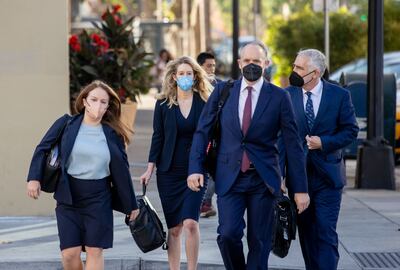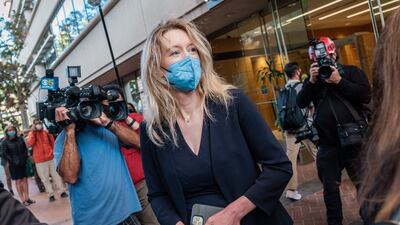Jury selection for Theranos founder Elizabeth Holmes's highly anticipated fraud trial is set to commence on Tuesday.
Up to 170 prospective jurors are expected to be questioned in federal court in San Jose, California.
The Silicon Valley figure has pleaded not guilty to defrauding Theranos investors and patients by falsely claiming the company developed technology to run a wide range of tests on a single drop of blood.
She could face years in prison if convicted.
Prosecutors allege the machines did not work after years of hype and that Ms Holmes knew about it, yet continued to lie to investors, doctors and patients as she raised more than $700 million.
“In terms of how much money the government has alleged has been lost, this case is actually not the biggest healthcare fraud case in the past year. There are many larger healthcare fraud cases than the Theranos trial,” said Jason Mehta, a lawyer and former prosecutor specialising in healthcare fraud.
“But in terms of media attention and scrutiny, it certainly ranks right up there as one of the bigger cases in the past decade.”
But Ms Holmes's claims of abuse could complicate jury selection, legal experts said.
Ms Holmes claimed she was abused by the company's chief operating officer, who was her boyfriend at the time.
Court papers submitted last year and unsealed on Friday revealed that Ms Holmes had accused former Theranos chief operating officer Ramesh “Sunny” Balwani of psychological and sexual abuse.
Ms Holmes's lawyers say her “deference” to Mr Balwani led her to believe reportedly false statements about Theranos that he controlled, including a claim about a partnership with Walgreens.
Her lawyers told the judge overseeing the case that Ms Holmes was “highly likely” to give evidence about these claims, court papers show.
Mr Balwani denied allegations of abuse in a 2019 court filing.

Christina Marinakis, a jury consultant with IMS, a provider of expert and litigation consulting services, said jurors may be hesitant to admit that a claim of abuse could “excuse” Ms Holmes's conduct.
“They may fear they are going to be looked at as misogynists,” she said.
Tracy Farrell, a jury consultant, said Ms Holmes's lawyers may favour younger jurors, particularly women, who might question any attempt by prosecutors to show the abuse defence as “just another con".
“It creates a kind of dissonance for women,” Ms Farrell said. “We want to believe them.”
Legal experts also say Ms Holmes needs jurors with a working knowledge of start-ups who could possibly consider Theranos to be an innocent failure rather than a massive fraud.
Ms Holmes, who launched Theranos in 2003 at the age of 19, once drew comparisons with Apple founder Steve Jobs.
When she founded the diagnostics company, Ms Holmes promised results that would be faster and cheaper than laboratories.
Political titans Henry Kissinger and former US defence secretary James Mattis were both drawn to Theranos's board, and media mogul Rupert Murdoch invested cash in the company.
Jurors could potentially hear evidence from these former board members and Mr Murdoch.
But jurors could also hear from patients who were victims of the faulty tests and received a variety of misdiagnoses.
“For many jurors, the patient testimonial likely will be the most compelling and the most moving testimony,” Mr Mehta said.
Opening arguments are scheduled to begin September 8 in San Jose, California.

